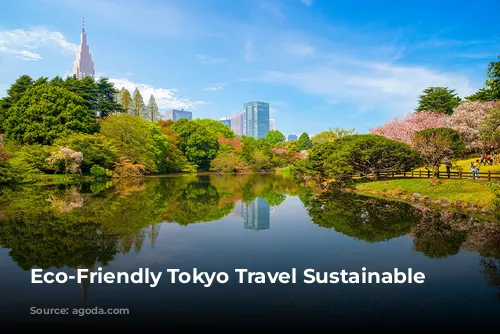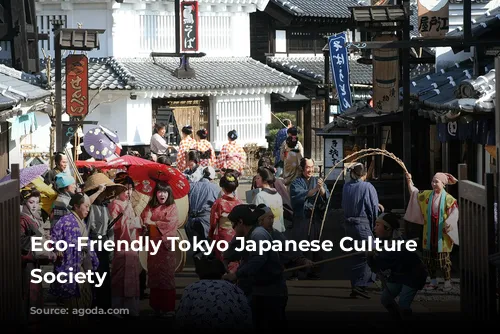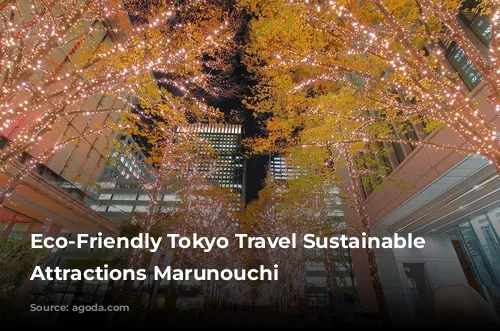Tokyo, a vibrant metropolis renowned for its dazzling neon lights and cutting-edge technology, is also a shining example of cleanliness and environmental responsibility. Unlike many other major cities, Tokyo’s streets are remarkably litter-free, a reflection of the strong environmental consciousness deeply embedded in Japanese culture from a young age. This commitment to a sustainable future extends to meticulous waste separation and recycling, readily apparent in public spaces like parks and subway stations. This eco-friendly mindset is evident in the city’s infrastructure, where public transportation isn’t just a necessity, but a preferred mode of travel. The efficient public transport system, heavily reliant on hybrid vehicles like the Toyota Prius, highlights Tokyo’s dedication to reducing its carbon footprint.

Embracing Tokyo’s Sustainable Ethos
As a visitor to Tokyo, you can actively contribute to the city’s sustainable ethos. Start by embracing the local practice of waste minimization and recycling. Tourists are encouraged to adopt habits like utilizing Tokyo’s world-renowned public transport systems. The shinkansen, or bullet train, offers a fast and eco-friendly way to explore the country, providing breathtaking views of the Japanese landscape, including the iconic Mount Fuji. Cycling is not only a healthy alternative but also a popular way to experience Tokyo’s vibrant atmosphere intimately. Simple actions, such as bringing your own chopsticks and refusing unnecessary packaging, can also align with Tokyo’s eco-friendly practices.

A Tale of Transformation: Air Quality in Tokyo
Tokyo’s air quality presents a compelling story of transformation. In the 1970s, Japan battled severe pollution issues, a consequence of rapid industrialization. The passage of the Basic Law for Environment Pollution Control marked a turning point in the nation’s history, tackling pollution-related health crises. Today, while Tokyo has transitioned away from fossil fuels, it still faces the challenge of completely eliminating its dependence on them. Although air quality has significantly improved, the city remains vigilant, acknowledging the ongoing threat posed by pollution.

Respecting Japanese Cultural Norms
Japan is recognized for its structured society, where loyalty, politeness, and collective harmony are paramount. As a visitor, understanding and respecting these cultural tenets is crucial. Japanese society places a high value on personal responsibility, education, and hard work, reflected in their low crime rates and orderly public spaces. When interacting with locals, remember that the Japanese handshake is typically gentle, with minimal eye contact, often accompanied by a respectful bow. Nodding is essential in conversations, signifying understanding and respect. Dress conservatively, avoid loud conversations, and refrain from public displays of affection to align with local customs.

Sustainable Travel: Supporting Local Businesses
One of the most impactful ways tourists can contribute to sustainable travel in Tokyo is by supporting local businesses. By choosing to stay at locally owned hotels, dine at organic restaurants, and purchase from local artisans, travelers not only enjoy an authentic experience but also promote sustainable economic practices. The city offers numerous opportunities to engage in eco-friendly activities, from visiting farmers’ markets to participating in community-centered experiences that highlight sustainable living.

Eco-Friendly Accommodations in Tokyo
Tokyo boasts a plethora of eco-friendly accommodations catering to diverse preferences and budgets. Consider staying in some of the city’s best neighborhoods, like Shinjuku and Shibuya, which are not only central to Tokyo’s lively nightlife and shopping but also offer convenient access to green transportation options.

Luxury and Sustainability: A Harmonious Blend
Luxury and sustainability coexist seamlessly in Tokyo’s hotel scene. The Imperial Hotel Tokyo and the Palace Hotel Tokyo are prime examples of this harmonious blend, offering lavish amenities while upholding sustainable practices. The Imperial Hotel, with its rich history and elegant design, is a landmark in itself. The Palace Hotel Tokyo, located just 1.3 miles from the city center, provides guests with convenient access to major attractions and green amenities.

Exploring Tokyo’s Landmarks Sustainably
For travelers seeking accommodations close to Tokyo’s famous landmarks, there are numerous hotels near Tokyo Tower and Tokyo Station that offer comfortable and sustainable lodging options. The Tokyo Station Hotel, for instance, is a luxurious establishment offering breathtaking views, situated in the Marunouchi district, renowned for its upscale shopping and dining.
Furthering Your Sustainable Journey
Visitors to Tokyo can further their commitment to sustainability by participating in various green initiatives. Engaging with grassroots organizations dedicated to environmental preservation and opting for carbon offsetting for flights are effective ways to make a positive impact.

